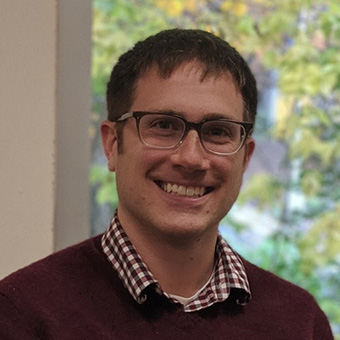Jacob Burg, PhD’20, English
 Lecturer and Writing Center Coordinator, Boston University
Lecturer and Writing Center Coordinator, Boston University
Can you describe your career path and how it has led to your current work?
By the time I started my graduate studies, I had already taught at a high school and knew I loved teaching. To this day, I still use some of the pedagogical skills I learned while teaching high school. From that experience, I thought, “Okay, this is something I would love to do,” but I was not wholly detached from the idea of pursuing a tenure track job. By the time I started moving into my dissertation, I was already thinking about what the job market would entail. I knew there were not going to be many jobs, so I gradually became more and more open to the idea of pursuing something other than a tenure-track position. Since I also had to make money as a graduate student, I figured that I could kill two birds with one stone by looking for job opportunities that would give me more teaching experience that would look good on applications for tenured, non-tenured, and non-college jobs. I worked as a teaching assistant and as a writing center consultant at Brandeis, before getting promoted to the co-director position. That was probably the best experience I had, in terms of my career trajectory. I now work at Boston University as a lecturer and writing center coordinator in their Writing Program.
What services and/or resources did you use while at Brandeis for your career search?
I primarily leaned on my advisors and other faculty members in the English Department. For example, when John Plotz and Ulka Anjaria found out that I had interviews for a few lecturer positions, they very kindly offered to run through not just one, but two rounds of practice interviews. That experience was invaluable, and I can pretty confidently say that I would not have gotten the job that I did were it not for them. Outside of the English Department, I spoke with Marika McCann a few times about my resume and how I might need to change it when applying for high school teaching positions. I always found all the people working in GSAS to be very welcoming and I'm sure I could have leaned on them more for career advice.
What skills from your Brandeis degree have you found most valuable in your current work?
Since I'm teaching at a university, I use the skills I learned while at Brandeis every day. Although I'm teaching writing rather than literature classes, there's still plenty of overlap. In particular, the ability to analyze a text and situate it within larger cultural and historical movements remains the hallmark of my work as a scholar and as a teacher. I also learned how to be a much more effective and concise communicator, which has paid dividends not only in my teaching, but also in the day-to-day minutiae of departmental emails and faculty meetings.
What advice do you have for current students as they embark on their job search?
Explore your interests and ask yourself questions like “What do you know? What are your interests? What experiences do I have to lean on?” I did not really pause to ask myself those questions in the flurry of searching for whatever jobs were available and applying to as many of them as I could. If I had taken the time, I think it would have made navigating the entire process far less daunting. I would also remind graduate students that there are a lot of sneaky skills that you acquire, just by being a graduate student - there's a resourcefulness and an understanding of how to engage with people in positions of power that are both really important for the job market. Also, remember that when you select a mentor, there are still other people working at Brandeis that can offer other perspectives. Don't be afraid to collaborate with a lot of different people. Finally, it's okay to fail. So many graduate students operate like perfectionists because of how dire the job market can be - it can feel like one wrong step and the job will be gone - but that is not actually the case. Better to take risks than try to map everything out perfectly.
Is there anything you wish you had done differently during your time as a graduate student that may have made the transition to your career easier? Or is there anything you did as a graduate student that you believe other grad students should do to better position themselves for a career?
Learn to absorb the experiences, because graduate school can initially be super intimidating and it can push some people to just put their heads down and try to get through whatever they're working on, rather than really taking the time to appreciate the fullness of the experience. Remember to check in with yourself. I wish I had done that more often. I wish I had taken the time to write down statements, like a statement of purpose and job letters, that challenged me to tell the story of my career, even if it hardly felt like a career at the time. I only tried to access those memories and boil them down to marketable skills after the fact, but I think it would have been a lot easier had I taken the time in the moment to jot things down, to catalogue experiences, like keeping a journal of sorts. I think slowing down once in a while to see how you are building yourself toward your career aspirations counts a lot - because whether we realize it or not, we are always building toward something. We just have to give ourselves credit for it.






